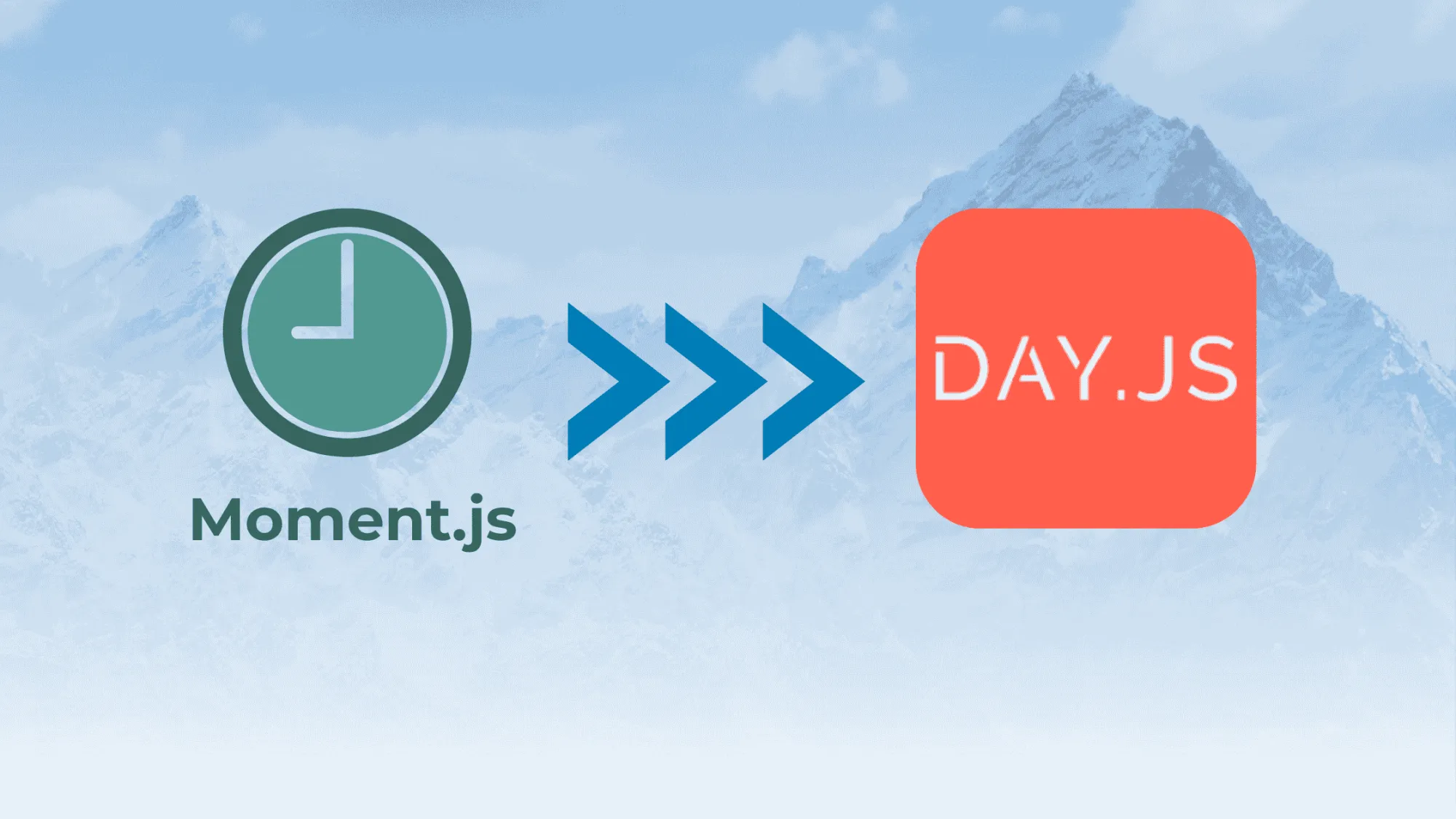When working with dates and times in JavaScript, Moment.js was, for many years, the go-to library for developers. Moment.js simplifies the often cumbersome and inconsistent behavior of JavaScript's Date() object, providing a more intuitive and reliable API for date parsing, manipulation, formatting, and timezone management.
However, as web performance and optimization became growing concerns, a new rival entered the scene: Day.js. Designed as a minimalist alternative, Day.js promises to deliver similar functionality with a much smaller footprint. In this post, we’ll explore why Day.js has gained popularity as the lightweight successor to Moment.js and why you might consider making the switch.
Why Performance Matters: The Case for a Lightweight Library
In modern web development, performance is critical. Every kilobyte saved on scripts can improve load times, reduce bandwidth usage, and enhance the overall user experience. Moment.js, while powerful and feature-rich, comes with a significant cost in terms of file size and includes many features that may go unused in most projects.
On the other hand, Day.js, weighing in at a lean 2KB gzipped, offers the core functionality developers need without the bloat. This modular, performance-first approach is a key reason for its rising popularity.
Day.js vs. Moment.js: Key Differences
Let’s break down some of the key reasons why Day.js has gained ground as a viable alternative:
- Modular Design
Day.js follows a modular architecture, meaning that instead of bundling all features into the core library, it allows developers to add specific functionality via plugins. Need advanced parsing or timezone support? Just add a plugin. By keeping the core library minimal, Day.js ensures that you’re only shipping the features you need.
Moment.js, in contrast, is monolithic. It includes a wide range of features by default, making the library larger and sometimes unnecessarily complex for simpler use cases. For instance, if you only need basic date formatting, Moment.js still loads extra functions you won’t use, resulting in wasted bandwidth and slower load times.
- Immutability by Default
One of the most distinct design choices in Day.js is its immutability. In Day.js, every operation that modifies a date returns a new instance, leaving the original untouched. This behavior aligns with functional programming practices and reduces side effects in code, making it easier to reason about.
Moment.js, on the other hand, uses mutable data structures. This means that manipulating a date object modifies the original instance, which can sometimes lead to unexpected behavior or bugs when working with shared data.
- Modern JavaScript and Simplified Code
Day.js leverages the latest JavaScript standards (ES6+), allowing for more concise and efficient code. By targeting modern browsers, Day.js can reduce complexity and overhead without needing to maintain backward compatibility for older environments.
Moment.js, being older and widely adopted, has to maintain compatibility with legacy systems. This results in a larger, more complex codebase that supports features that may not be relevant to modern applications.
- Focused Feature Set
Day.js keeps its core feature set simple and to the point. Basic date parsing, manipulation, and formatting are handled seamlessly. For more advanced use cases, such as timezone handling or localization, developers can install plugins as needed.
While Moment.js offers many more built-in features, such as relative time, calendar time, and localization out of the box, many developers find that they don’t need this level of complexity for basic date manipulation tasks.
Feature Parity: Can Day.js Replace Moment.js?
One of the biggest concerns for developers when adopting a new library is whether it offers all the functionality they need. Fortunately, Day.js offers nearly full API compatibility with Moment.js. This means you can often replace Moment.js with Day.js in your code with minimal effort.
Here’s a quick comparison of some common use cases:
As you can see, the syntax is nearly identical, making Day.js an easy drop-in replacement for many Moment.js use cases.
Enhancing Day.js Functionality with Plugin Extensions
By default, Day.js is a lightweight and fast library for handling dates, but it can be easily extended using plugins to match specific requirements. In the example below, two powerful plugins customParseFormat and isSameOrAfterare added to boost Day.js's capabilities.
import dayjs from 'dayjs';
import customParseFormat from 'dayjs/plugin/customParseFormat';
import isSameOrAfter from 'dayjs/plugin/isSameOrAfter';
dayjs.extend(customParseFormat);
dayjs.extend(isSameOrAfter);
export default dayjs;
With customParseFormat, Day.js can parse non-standard date strings, making it easier to work with custom date formats. The isSameOrAfter plugin provides comparison functionality, allowing developers to check if one date is the same as or after another.
By leveraging the .extend() method, these plugins integrate smoothly into Day.js, creating a powerful and modular date management solution. The Day.js instance extended with these plugins can be used throughout the project, ensuring that any code importing this module can utilize the enhanced features of Day.js.
Why Should You Switch?
While Moment.js served the JavaScript community well for years, it has now entered maintenance mode. The developers of Moment.js themselves recommend considering newer, lighter alternatives like Day.js for future projects. Here are some compelling reasons to switch:
- Smaller File Size – Day.js is more than 30 times smaller than Moment.js, reducing load times and improving performance.
- Immutable Data Handling – With Day.js, date manipulation is safer, more predictable, and aligned with modern functional programming practices.
- Modern JavaScript – Day.js embraces ES6+ standards, providing a cleaner and more optimized codebase.
- Plugin Ecosystem – Instead of shipping a monolithic library, Day.js allows you to pick and choose additional features, keeping your code lightweight.
- API Compatibility – With near-identical APIs, switching from Moment.js to Day.js is often straightforward.
Conclusion: Day.js for a Lighter, Faster Future
For modern web apps focused on performance, Day.js is a lightweight, efficient alternative to Moment.js. Its modular design, immutability, and modern JavaScript support make it ideal for handling date and time tasks without the bloat. As web development moves toward smaller libraries, Day.js stands out as a worthy, streamlined successor. Ready to make the switch? Try out Day.js in your next project and experience the performance boost for yourself!
